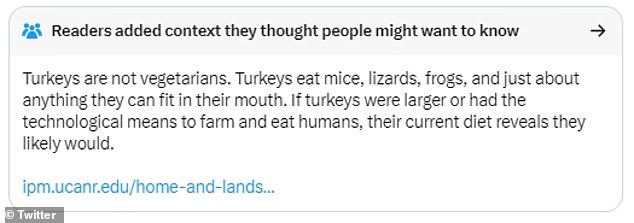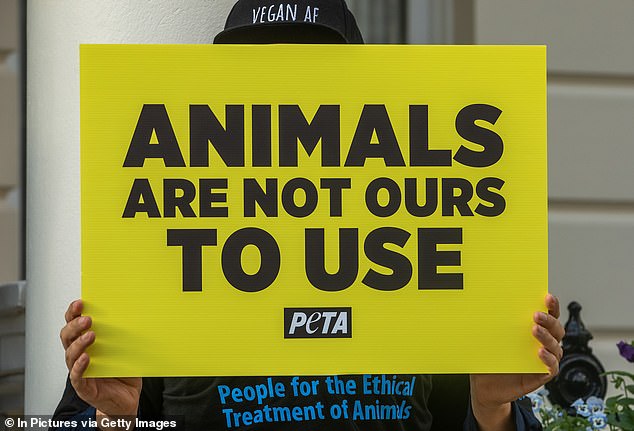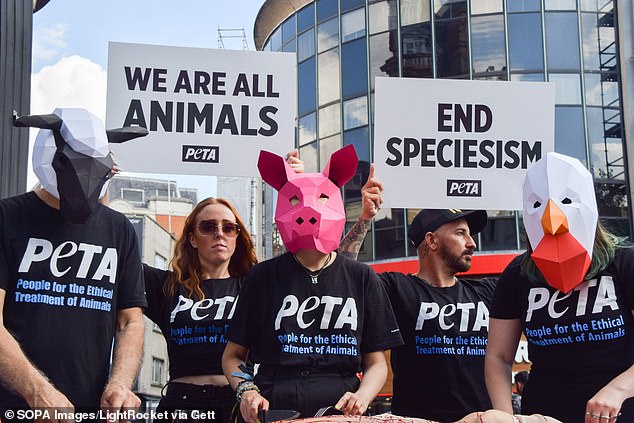Turkeys would eat us if they could! Hilarious moment PETA is fact checked over viral tweet claiming birds ‘would never’ feast on human meat at Thanksgiving
- Animal rights group PETA posted a photo on X showing turkeys sitting around a table with human meat to encourage people to go vegetarian during Thanksgiving
- The message was later checked in Community Notes by an unknown user
- PETA and the artist of the photo have not yet responded to the criticism
Turkeys weren’t the only thing roasted on Thanksgiving this year — PETA’s not-so-festive post on X was ridiculed by social media users after it was brutally fact-checked.
Before the holidays, the People for the Ethical Treatment of Animals posted a photo on X (formerly Twitter) of a family of turkeys sitting around a table with human meat in the middle.
The famed animal rights group captioned the photo: “We’re lucky turkeys would never do this to us – you don’t have to do it to them either.”
But the post was later fact-checked in Community Notes by an unknown user who claimed: ‘Turkeys are not vegetarians. Turkeys eat mice, lizards, frogs and just about anything they can put in their mouths.
“If turkeys were bigger or had the technological means to grow and eat humans, their current diets show they probably would.”
The People for the Ethical Treatment of Animals posted a photo of a family of turkeys sitting around a table with human meat in the center ahead of the holiday to X (formerly Twitter).

But the message was later checked in Community Notes by an unknown user
The user quoted research by University of California Integrated Pest Management as a resource in the same Community Note.
After the post was fact-checked, many users flocked to the comments section to criticize PETA’s claim.
One user wrote: ‘Turkeys don’t do that because humans are apex predators and too big to hunt effectively. Frogs and lizards, on the other hand, have ample hunting potential.”
Another wrote: ‘Don’t worry, I’ve corrected the image for accuracy. Turkeys would happily peck a Thanksgiving turkey to the bone. Sad but true. Perhaps you can help raise poultry awareness about poultry violence and the risk of cannibalism.’
One user also called the Community Note “the best ever.”
The post, which currently has more than 35 million views and 11,000 likes, was also mocked online by political commentators.
“Do you ever post about how many birds are killed by wind turbines?” That’s what Republican strategist Scott Presler wrote.
“PETA rose to prominence in the community and it is one of the best,” wrote Tousi TV founder Mahyar Tousi.
The photo was taken by an artist called ‘The Vegan Rapper’, who has not yet responded to PETA’s post. The group has also not yet responded to the criticism.
UC-IPM research shows that for centuries, turkeys supported Native Americans and later Europeans during colonization and settlement in the 17th century.
Many consider wild turkeys in urban and suburban environments to be a nuisance, pest, annoyance, destructive and aggressive.

The photo was taken by an artist called ‘The Vegan Rapper’, who has not yet responded to PETA’s post. The group has also not yet responded to the criticism

If a human is perceived as dominant, the turkey may behave passive or fearful towards him. If a person is perceived as submissive, he may be bullied
As urban and suburban turkey populations have grown, so have human-turkey conflicts. They can become aggressive during the breeding season, occasionally attacking and threatening people, and damaging cars by ‘attacking’ their reflection or jumping on cars.
Their non-stop search for food can destroy gardens, raised beds, new landscape plantings and even lawns.
If a human is perceived as dominant, the turkey may behave passive or fearful towards him. If a person is perceived as submissive, he may be bullied.
An aggressive bird may attack, chase, or even attempt to attack the person by flapping its wings, pecking, or spurring, especially on human males.
